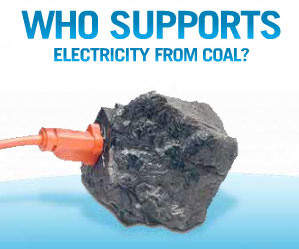Polluting Industries Caught Forging Support
When you are a small non-profit working to reform billion dollar industries, you can take some solace when the other side is damaging their own case far more seriously than regular citizens ever could. The last few days have been a highlight reel of the fossil fuel lobby tripping over their own feet, culminating in a buffoonish failed attempt at forging opposition to the climate bill.
 Specifically, Washington, D.C. based lobbying firm Bonner and Associates has been found to have forged letters of opposition to the climate bill under the names of Charlottesville area non-profits. Bonner and Associates then sent those letters to a targeted Congressional office in hopes of influencing votes on climate legislation. Appalachian Voices opposes these tactics because they undermine the public trust upon which democracy is ultimately built.
Specifically, Washington, D.C. based lobbying firm Bonner and Associates has been found to have forged letters of opposition to the climate bill under the names of Charlottesville area non-profits. Bonner and Associates then sent those letters to a targeted Congressional office in hopes of influencing votes on climate legislation. Appalachian Voices opposes these tactics because they undermine the public trust upon which democracy is ultimately built.
More than that, Appalachian Voices is also a non-profit with an office in Charlottesville, and could have just as easily been one of the victims of this fraudulent behavior. It is a shame that our neighbors who work so hard in our community have to deal with this corporate identity theft. It is wrong and sad that the industry felt as though it had to resort to these underhanded and dishonest tactics.
By misrepresenting themselves, the fossil fuel industry is doing the same thing to their own fragile credibility that they are doing to the Appalachian Mountains. But, their actions become even more appalling when put in context.
The recession has even reached the corporate lobbying world, which saw its own spending decrease last quarter (by a whopping one percent.) However, today’s Wall Street Journal notes that the fossil fuel lobby seem to be the only ones bucking the trend and upping their spending in this time of crisis:
Debate over a broad-ranging climate and energy bill prompted more spending by energy interests. Chevron Corp., ConocoPhillips, BP PLC and other oil-and-gas companies increased spending on lobbying by 30% to $37.7 million in April, May and June of this year, compared with the same quarter in 2008.
Lobbying expenditures, campaign contributions, and the resulting public policy from the last several decades has shown us time and time again that we are not exactly on an even playing field as the coal, oil, and gas lobby. When it comes to Congressional influence, environmental groups aren’t even playing the same game as the fossil fuel industry. For comparison, the “blue-green alliance,” a coalition of labor and environmental groups and the second largest labor lobby, spent just 2% of what the aforementioned oil and gas giants did during the same time period.
Thanks to a few sharp staffers for Virginia Congressman Tom Perriello, we are able to see how far the other side is willing to go. The following letter is one of six forged documents that were sent to Congressman Perriello in opposition to the climate bill, which Congressman Perriello ultimately voted for. This letter is purportedly from “Creciendo Juntos“ which is a Hispanic advocacy organization in his district.

[See 5 other forged letters here]
However, it turns out that these letters were forged by DC based “Bonner and Associates,” who dismissed the incident as a “mistake.” Needless to say, the groups who were victims of the forgery strongly disagreed:
This was not a “mistake,”…This was a deliberately and carefully forged letter…They stole our name. They stole our logo. They created a position title and made up the name of someone to fill it. They forged a letter and sent it to our congressman without our authorization,” said Tim Freilich, who sits on the executive committee of Creciendo Juntos, a nonprofit network that tackles issues related to Charlottesville’s Hispanic community.
But this may not be the first time. A former employee of Bonner and Associates says differently, via TPM:
A former Bonner and Associates employee who spoke to TPMmuckraker significantly complicated that picture, portraying Bonner and Associates as a place where ethical missteps were far from rare. “They just got caught this time,” he said.
After a similar incident in Maryland in 2002, Bonner and Associates founder Jack Bonner dismissed their behavior, calling it “…a great exercise in the first amendment.”
This is inexcusable. Appalachian Voices disagrees with these tactics and applauds Congressman Ed Markey’s call for Congressional investigation into the case. Congressman Markey, who chairs the Select Committee on Energy Independence and Climate Change, said in a statement:
This fraud on Congress shows that some opponents of clean energy have resorted to forgery and theft to block progress.
This is an appalling abuse, and Congressman Tom Perriello deserves great credit for seeing through it and casting a vote that will create clean energy jobs in Virginia and throughout the United States. I encourage all Members of Congress to be on the lookout for other suspicious and illegal materials.
My Select Committee will immediately begin an investigation of the extent and scope of this activity.
…
But it gets better. Nearly simultaneously, ICG coal executive Eugene Kitts declared “war” on Appalachia, going so far as to claim that the coal industry is a victim. Mr. Kitts asserted that local mountain communities are, in fact, the aggressors in this “war” on the poor coal industry, saying:
We are in a war…I believe that mining is going to survive this attack. I think when the public is informed and their political representatives are informed that this assault on surface mining is based on such a strenuous type of basis, that we will prevail in this battle. We are in a war, and that war will continue…
Part of this “war,” has been to try and punish places that want to keep their mountains in tact. Coal industry leaders have recently been pushing with all their might to have their employees and other miners boycott the state of Tennessee because of Senator Lamar Alexander’s exemplary leadership on the Appalachia Restoration Act (S 696.) To me that sounds like someone saying, “Let us destroy your kitchen or we’re not coming over to your house.” Hmmm…I wonder how Tennessee will react to that?

Of course, the coal executive boycott has been a pathetic joke, with several industry leaders already pulling out. A TECO spokesman explained why his company was “out” of the boycott just as soon as they had been “in,” saying:
We regret our previous action, which was an emotional response that doesn’t benefit our 1,200 employees, the eastern Kentucky communities we support, the environment we work to protect or our neighbors in Tennessee.
Over the weekend, the coal executive boycott of Tennessee was wildly lampooned by the two largest newspapers in east Tennessee. But the Chattanooga Times-Free Press was especially brutal, saying:
Among the most destructive environmental abuses in this nation, the most deliberate, unconscionable and widespread has to be the form of coal-mining known as “mountain-top removal” mining. Indeed, “mining” is hardly the word for this premeditated, callously calculated, man-made catastrophe.
The Times-Free Press lets the coal industry have it for their behavior, while praising Senator Alexander’s push for responsible mining via introduction of the Appalachia Restoration Act (S 696.)
That has riled coal company executives, who, in turn, have rounded up West Virginia miners to sign petitions pledging to retaliate against Sen. Alexander’s legislation by mounting a boycott of Tennessee’s tourism industry. That’s akin to hostage-taking, of course. The state’s tourism industry, particularly the Gatlinburg-Pigeon Forge-Dollywood areas around the Smokey Mountains, is an innocent bystander in the miners’ dispute.
The campaign, and its nasty component of threatening calls to tourism facilities, should be rejected. People who love visiting our mountains should be appreciative of Sen. Alexander’s efforts. Indeed, tourism is far more lucrative to mountain communities than mining.
Mountain-top removal mining should be banned. It employs far fewer miners than traditional mining practices, and its environmental costs are vast. It has already destroyed scores of mountain tops and over 2,000 miles of valley streams and the communities they support. It should be banned as soon as possible.
In case this long list of incidents has left you scratching your head in confusion, don’t worry. Massey CEO Don Blankenship, as he often does, inanely fills in the blanks for us with his deep thoughts at the anti-science “American Thinker”. Here it is, your moment of zen:
A religion is a belief in a supernatural being, a system of faith or worship. Obviously, global warming does not fit this definition.



 (Great story, originally posted by our friend Jeff Biggers at
(Great story, originally posted by our friend Jeff Biggers at 
 There have been some very interesting developments since we
There have been some very interesting developments since we  It has also come to light that on behalf of “c@$#n coal” industry front group
It has also come to light that on behalf of “c@$#n coal” industry front group 










 Governor Tim Kaine of Virginia, a close ally to President Obama and current head of the Democratic National Committee (DNC), came out with this statement in favor of the Administration’s proposal regarding mountaintop removal removal yesterday.
Governor Tim Kaine of Virginia, a close ally to President Obama and current head of the Democratic National Committee (DNC), came out with this statement in favor of the Administration’s proposal regarding mountaintop removal removal yesterday. Congressman Yarmuth applauded the Obama Administration’s action yesterday, but calls for Congress to address valleyfills by taking action on the Clean Water Protection Act (HR 1310), which was introduced by Congressmen Pallone (D-NJ), Reichert (R-WA), and Yarmuth (D-WA)
Congressman Yarmuth applauded the Obama Administration’s action yesterday, but calls for Congress to address valleyfills by taking action on the Clean Water Protection Act (HR 1310), which was introduced by Congressmen Pallone (D-NJ), Reichert (R-WA), and Yarmuth (D-WA)